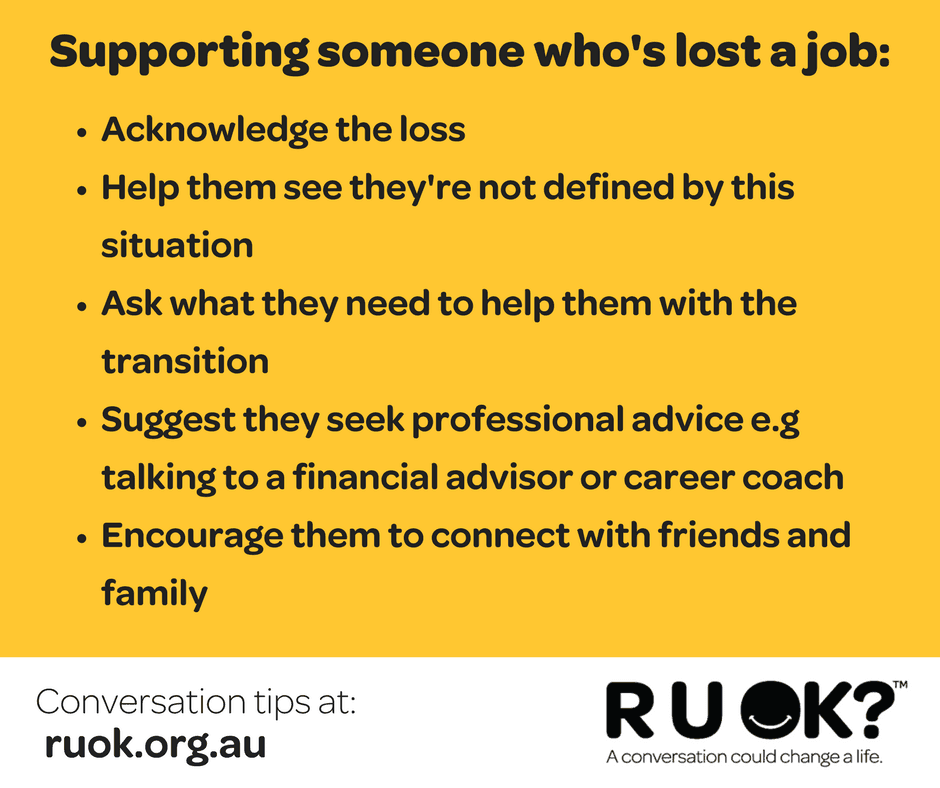Tips on transitioning out of the workforce
Rachel Clements is the Director of Psychological Services at the Centre for Corporate Health and member of the R U OK? Conversation Think Tank. She shares her tips for managing the transition out of the workforce:
Q. What affect can transitioning out of the workforce have on me?
“Transitioning out of the workforce can be a stressful time for you financially, emotionally and can impact your relationships and health. "Those who have strong social support and who are engaged in the community usually have the smoothest and most enjoyable transition. This is important when going through any change in your life because supportive relationships are one of the strongest buffers for our mental health and resilience. We encourage anyone facing a period of change to start planning activities and touch points that will help them stay connected to their support network. "
We encourage anyone going through a career change to set out a plan and seek professional advice to help them manage these changes - like talking to your financial advisors and trusted health professionals.”
What can I do to manage the transition?
- Understand that it may take time to adjust to the change.
- Set some personal goals for after the transition to keep you on track and feeling a sense of purpose, achievement and motivation. Consulting a career coach can be a great way of helping with this.
- Before you transition or retire, think about what you plan to do with your extra time. Having meaning and purpose is very important for maintaining your wellbeing throughout this time of transition. You might consider joining community groups or clubs to build your social support network or volunteer in a field you are passionate about.
- Focus on your health and fitness to help make this new time in your life enjoyable and ward off excessive health care costs.
- Get your finances in order and find new ways to cut your expenses to reduce any financial pressure.
- Talk to your friends and family about what you want your transition or retirement to look like. This helps manage their expectations and provide insight into what early warning signs may look like should you appear to be struggling with the adjustment.
- Stay connected to friends and family.
Q. How can family and friends support someone transitioning out of the workforce?
“The support of colleagues, friends and families can really help someone regain their balance and feel a sense of comfort, confidence and control during this period of transition and change. “A number of factors can affect how someone copes with the transition – their financial situation; their health, both psychological and physical; and their perception of what that next step will be. Friends, family and colleagues can play an important role in helping someone process the change by checking in regularly over the phone, face to face or via SMS.”
What are some of the signs someone might be struggling with the transition?
The early warning signs include: • Irritability and frustration
- Anger
- Moods swings
- Withdrawal from friends and family
- Sleep disturbance
- Ceasing usual activities
Q. What can I do if someone’s struggling with the transition?
“If you notice they’re not coping, it is important to have a supportive conversation with them to help them get back on track. Encouraging them to get active, try something new or join a community group can all help in reducing feelings of loneliness and helplessness.
“If you notice that they are experiencing low mood, increased anxiety or have not been themselves for longer than two weeks, it is important to encourage them to speak to their GP or another health professional such as a psychologist to help them manage the transition and get back on track.”
Find tips to get the conversation started here.
Find helplines and professional supports here.






















